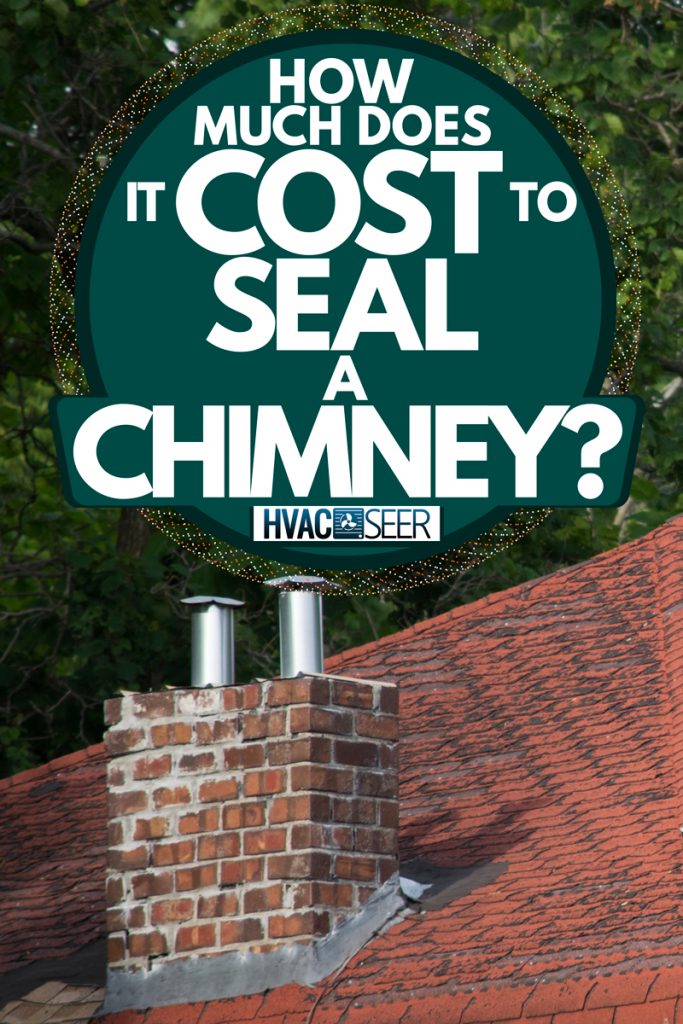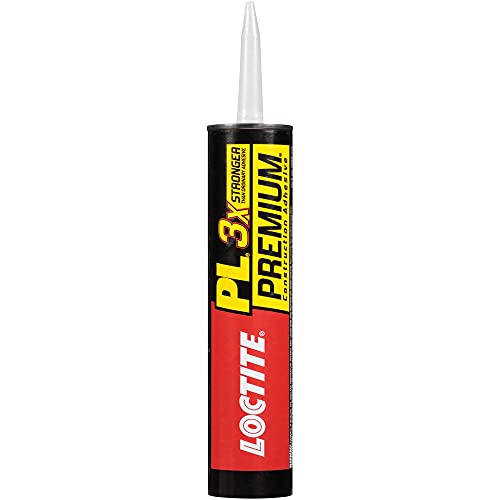Whether you're thinking of installing a chimney or already have one, it can be daunting to think of the labor and materials required to seal a chimney properly. Don't worry, because we've researched sealing chimneys for you.
Sealing a chimney can cost between $20 and $60 for sealant you'll apply yourself and between $200 and $400 for a professional company to seal your chimney. Price also depends on your chimney's size, if you want it waterproofed or not, and ease of accessibility.
Why should you seal your chimney? What is the best sealer for a chimney? How long should a chimney last? Keep reading to learn the answers to these questions and more.

Cost Factors For A Sealed Chimney
If you decide to hire professionals to seal your chimney for you, there are a few things that can determine the price of materials and labor.
Size
If you have a larger chimney, there will be a larger surface area to cover. This will use more sealant, more time, and cost you more overall than a smaller chimney. Also, if your chimney uses smaller bricks, this will use more sealant to fill any existing cracks.
Waterproofing
Typically, choosing to waterproof your chimney while you get it sealed will cost between $30 and $80 more for materials plus the cost for additional labor time. However, choosing to waterproof simultaneously while sealing your chimney will save you overall because you won't have to pay a professional to make two trips.
Accessibility
A difficult to access chimney will increase costs because it will take longer for the professional to work and apply the sealant. Some chimneys that are harder to access include steep chimneys, chimneys with complicated house scaffolding, or crumbling chimneys. Especially if the crown isn't accessible from the roof, it will be difficult for you or a professional to access it and require additional labor costs.
Self-Sealing Your Chimney
Sealing your chimney yourself is much less expensive than hiring a professional to do it for you, but it is complicated and can be easy to do incorrectly. Here are the basic steps you'll need to follow:
1. Purchase supplies
First, you'll need to purchase a chimney sealant and a water-sprayer to apply it. For sealing the crown, you'll want to purchase a chimney cap to prevent the sealant from leaking down the chimney and some duct tape to tape off the sides of the crown.
Purchase a chimney sealant from Amazon here.
2. Seal the Crown
The chimney's crown sits on the top of the chimney to prevent moisture from falling down the chimney. Because they're usually made of mortar, a porous material prone to expansion and contraction with temperature changes, crowns can develop cracks over time. A sealant helps reduce the number of cracks that will form and prevents the expansion of existing ones. Some crowns are made of concrete, which is stronger against nature but can still develop cracks, so it should be sealed.
To seal the crown of your chimney, you'll want to give it a good clean, make sure it's dry. Fill any large cracks with caulk. You'll then want to cover the chimney with the cap and wrap duct tape around the side, about two inches from the top. Make sure you also cover the flue lines.
A crown sealer usually isn't water-based like sealers for the rest of the chimney. To apply the sealant, you can either apply it using a gloved hand or use a paintbrush. Let the sealant dry for a couple of hours before applying a second coat.
3. Apply the chimney sealant
Once you've sealed the chimney's crown, you can apply the water-based sealant to the rest of the chimney using a sprayer. Stand back far enough to get an even application; keep the sprayer nozzle moving as you start from the bottom and work your way upwards. You should also apply two coats of sealant on the shaft of the chimney.
Professional Sealing
Sealing your own chimney can be time-consuming and easy to do incorrectly. Especially if you have difficulty accessing your roof or chimney crown, it might be easier to hire someone who knows what they're doing. Hiring a professional is always the best route when it comes to the quality of work done, but it will cost you $200 to $400 for labor and materials. A simple online search can get you started to find chimney professionals in your local area.
Why Should You Seal Your Chimney?
Sealing a chimney and patching up cracks regularly helps prevent further degradation and therefore preserves your chimney for longer. Because brick is an easy-crumbling material, the better care for it, the longer it will last, and the less expensive repairs will be along the road. Chimney crowns are also very expensive to replace, and they are essential to keep your chimney shaft free of water and dirt. Sealing cracks and protecting your crown will keep your chimney clean and prevent the inside of your house from getting dirty.
What Is The Best Sealer For A Chimney?
Masonry Defender Chimney Brick Sealer
This Masonry Defender chimney sealer is a water-based sealant for easy application and quick drying. It dries clear and also includes a water-repellant. This gallon jug will cover 90-150 square feet of surface area.
Click here to purchase this product on Amazon.
LastiSeal Brick & Concrete Sealer
This sealant can be applied by brush, roller, or sprayer and goes on clear. It has a warranty for 15-years and is guaranteed to protect your chimney against natural elements.
Click here to purchase this product on Amazon.
Black Diamond Water Repellent
The Black Diamond water repellent is a heavy-duty sealant that can be applied with a brush, roller, or sprayer. It promises to protect for up to 12-years. It may cause some darkening, but it's a great sealant with an additional water-repellent feature.
Click here to purchase this product on Amazon.
How Do You Waterproof A Chimney?
Waterproofing a chimney is similar to applying a sealant. If you're going to do it yourself, here are some steps to follow:
1. Gather your Materials
You'll need to purchase a chimney waterproofer and an air-pressurized sprayer for application. Keep reading below to compare different chimney waterproofing options.
2. Clean your Chimney
You'll want to clean your chimney and remove any buildup and dirt from the surface. It's also recommended to use a chimney cleaner to get the surface as clean as possible so the waterproofer can adhere better to the bricks.
Purchase Masonry Saver's Brick & Masonry Cleaner from Amazon here.
3. Cover Surfaces and Repair Cracks
Before you waterproof your chimney, you'll want to repair any existing cracks with silicone or caulk to stop the cracks from spreading. You also want to lay sheets or tarps around the roof, so the waterproofing solution doesn't spray onto your shingles.
Click here to purchase a Loctite brick sealant from Amazon.
4. Apply the Waterproofer
You'll likely want to use an air-pressurized sprayer to apply your waterproofing solution. Fill up your sprayer according to directions and start from the bottom, slowly moving across and working your way upwards. Just like the chimney sealant, you should let the waterproofer dry and apply a second coat to ensure maximum protection.
What is the best waterproofer for a chimney?
ChimneySaver Water-Base Water Repellent
This is a really great water-proofer because it can be applied to wet surfaces and goes on clear. It's also very breathable and allows vapors to escape. It comes in a silicone version, which is recommended if a water-based repellent has already been applied. However, the silicone version is not breathable and traps vapors inside, which can cause faster deterioration of the bricks.
Click here to purchase this product on Amazon.
CHIMNEYRX Water Repellent
This waterproofer is water-based and applies easily using an air-pressurized sprayer. It dries clear and doesn't alter the surface of the bricks. It's promised to provide long-lasting protection from water damage and moisture in the air.
Click here to purchase this product on Amazon.
Eco Advance Concrete & Masonry Siloxane Waterproofer
This Eco Advance waterproofer is a natural waterproofer that can be applied with a sprayer and dries clear. It's guaranteed to provide long-lasting protection and breathability.
Click here to purchase this product on Amazon.
How Long Should A Chimney Last?
Because brick is a porous and easily breakable material, it will crumble over the years. Usually, a brick chimney will last 15-20 years with regular repairs before it needs to be completely replaced. Here are some things you can do to help your chimney last longer:
Clean Your Chimney Regularly
Even if you don't use your fireplace very often, you should clean your chimney inside and out regularly. Birds and squirrels especially like to build nests in unused chimneys, and disposing of them early can help keep your brick intact. Furthermore, cleaning the inside of your chimney helps prevent the buildup of soot and smoke.
Repair Problems Quickly
If you notice large or even small cracks in your chimney, it's best to get them repaired as soon as possible, so they don't spread even more. You may need to call a professional in extreme cases, but for smaller cracks, you can purchase a silicone or caulk sealant and fill the cracks yourself.
In Conclusion
Chimneys can be high-maintenance, but sealing your chimney can help prolong its life and prevent future damage. Typically, hiring a professional to seal your chimney will cost between $200 to $300 for materials and labor. We hope you've learned something new about chimneys and how to take care of yours.
Before you go, check out some of our other posts we think you might like:








